
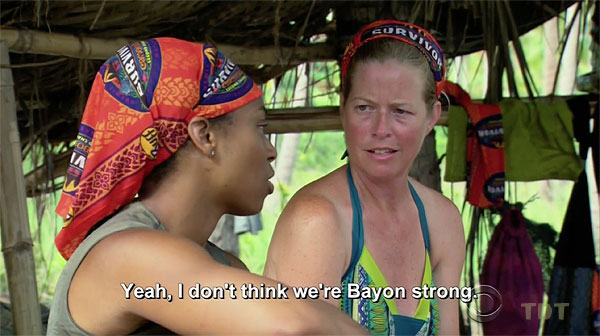
I know I mentioned this a couple weeks back, but I think it’s only fair to say it again: This season of Survivor is, simply, really good. I mean, as we can all agree, I think, most seasons don’t kick in 'til after the merge.
Not Cambodia.
Yes, this episode kept me on the edge of the couch and worked on basically every level, but pretty much every episode this season exceeded expectations. And, honestly, can anybody really predict where we’re going yet? I don’t think so. I’m super excited for a killer endgame. With so many strong players left standing, I can’t imagine we’ll be disappointed.
But let’s start talking about this episode. I went back and forth on what theory to utilize this week. I think this episode was pretty tough because of the many moving parts and confrontations that went into the vote. I settled on a theory, though.
We’re going to talk about framing today.
Framing theory — which some scholars hesitate to call an actually theory since it has no predictive power — is one of the more versatile theories we’ll talk about this season. When I say versatile, I really just mean that it’s used consistently in a whole host of different disciplines. Because of my background with studies of the mass media, we’re going to look at framing from a mass communication and sociological perspective.
Introduced to academia by an English anthropologist named Gregory Bateson, framing really describes how people organize, communicate and, in turn, understand media messages. From my perspective, one of the people most responsible for popularizing the study of how media messages get framed is the great (to me) Todd Gitlin, a sociologist at Columbia’s School of Journalism who studied how the media covered the New Left in the 1960s.
So let’s kind of describe framing a bit better, from a journalism view. Basically, framing describes how journalists make sense of information in a story and therefore how they tell the story. What does this mean? Well, if you’re a journalist covering a story, you’re going to get way more information than you need about a particular subject. You’re going to choose what goes in the story and what order you put that information in. This is the idea of framing. You’re making certain parts of the story more salient than others. Basically, if you’re a good journalist, you’re thinking about what’s the most important part of the story and you’re highlighting that portion the most strongly. You’re making that point more salient or more prominent.
Now, as someone who worked in newsrooms for almost a decade, I can assure you I’ve never heard a journalist talk explicitly about framing. It’s just part of what they do without thinking, all based on a lot of different reasons such as culture, training, organization and a host of other factors. But us media scholars, we study how stories are framed, how journalists frame certain subjects because research shows that the way stories are framed significantly affects how people make sense of information.
What does this have to do with Kass, Savage, Tasha, Ciera, Spencer and everyone else that played a big role in this episode? Well, I would argue the way certain contestants framed information they shared, significantly affected how other contestants perceived the information.
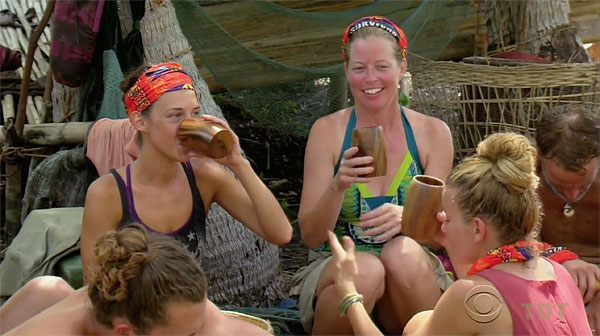
Let’s take it from the top. The tribes merge and almost immediately, we see Kass telling her tribemates, new and old, about how she “saved” Spencer and how now her and Spencer are working together. Was that information accurate? Yes. But she focused on the part about her and Spencer working together, not about how Spencer was leaving if he didn’t work with Kass.
And then we see Ciera telling her tribemates, new and old, how Andrew wanted to get rid of people like Joe and Jeremy. Of course, Savage moaned about “lies.” Were either really lying though? I would argue no. See, after not being voted out at the last tribal and understanding his back was against the wall, Savage told his tribe he wanted to work with them for the rest of the game. Implied in that, of course, is that he would vote out folks such as, um, Joe and Jeremy. Savage, obviously, didn’t explicitly say that and certainly didn’t mean it since he was lying to Ciera, Kass, Spencer and co., so he protested to the merged tribe that Ciera lies.
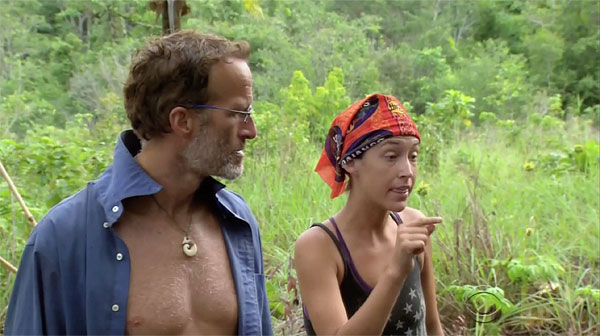
But, each was framing information in a specific way to make themselves look better or to communicate a specific piece of information. Savage wanted to make sure the rest of his alliance thought he was Bayon strong. Ciera, sensing, possibly, that she could be in the minority, wanted to use Savage’s past comments in a way that could potentially hurt him and help her.
The same thing happened later when Kass and Tasha disagreed over what went down during their first conversation post merge. Both told the truth when they later relayed the conversation to other contestants, but both focused on certain parts of the conversation. Basically, both framed the story in a specific manner hoping to get the intended audience to use the information in a specific way.
This happens all the time in journalism. Think about, say, when the last Republican debate happened a little more than a week ago right on the campus I teach at. After an event like that happens, you can read stories about it from different organizations, say Fox News or MSNBC, and though neither print false information, generally, they frame what went down in a certain way to convey a specific meaning to the audience.
And this happened on Survivor this week. Kass and Tasha and Savage and Ciera all told the truth, generally, but all framed the truth in a different way, hoping to make specific parts of their stories salient. What the audience chose to believe, well, that’s out of the disseminator’s hands. It seems like most everyone believed Savage and Tasha. Why? Probably confirmation bias … but now we’re getting into a different concept.
Because I don’t feel good today, we’ll stop here and jump into our contestant-by-contestant thoughts. But next time you tell a story, think about what information you’re shining a light on in that story and what information you’re not playing up. That’s framing. And you’re affecting how the person listening interprets that message and how that person then creates a reality of sorts.
OK, here we go:
Orkun
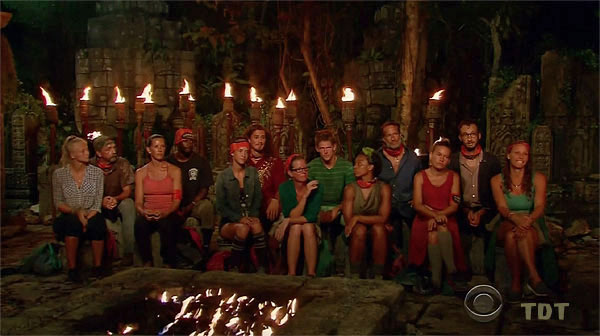
- 1. Spencer — I’m convinced now. I think I would bet, maybe, a whole $5 that Spencer’s at least going to make final Tribal. I hope I’m wrong since I don’t think he’s played a stellar game or anything, but, man, the dude is narrating the whole season, never goes home even when he should (right, Kass?) and now seems to be in a great spot. And the early merge helps Spencer the most, I think. No longer is he an odd man out, he’s a crucial swing vote shielded by big players, both physical and strategic.
- 2. Ciera — Ciera is certainly the woman who once voted her mom out. But now she’s also the woman obsessed with making “big” moves even when “big” is synonymous with “stupid.” I stand by what I said last week: Ciera made a huge blunder going after Woo and not Spencer or Savage. And she made another big mistake by talking about Savage and then her whole speech at Tribal. What the heck does something like that accomplish besides her getting to whine about people trying to win, whatever that means, and putting more of a spotlight on her? Folks like Ciera need to play under the radar until she makes a big move that could lead to an endgame. She certainly didn’t do that.
- 3. Abi-Maria — I love Survivor so much more when they don’t pay too much attention to Abi. Life has been good the last couple weeks. I mean, I’m sick, but Survivor life is good since I didn’t have to hear about how other people are dead to Abi or how she has an alien tendon in her knee.
- 4. Andrew — You know what Savage reminds me of? A Playboy magazine. You see, in those magazines (so I’m told), there are heavily “edited” photos of women, photoshopped edits meant to make the women look better. Well, Savage always portrays himself in a very specific classy veneer. But that veneer wore off when he started swearing and calling people horrible things because they had the nerve to, um, play Survivor.
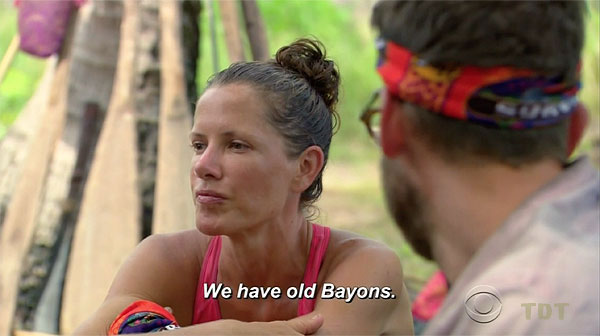 5. Kelly — I don’t understand. I keep hearing that someone from Survivor’s very first season is playing in this one. Yesterday, someone told me that and I was like, “I think you’re wrong.” And then they said, “You calling me a liar?” And I said, “Yep. I guess so.” And then they punched me in the face and said something about a rat and a river guide. I don’t have any clue what they meant and, frankly, I had trouble paying attention because my face hurt. I was punched. I don’t get it. Clearly nobody from Borneo is on this season, right?
5. Kelly — I don’t understand. I keep hearing that someone from Survivor’s very first season is playing in this one. Yesterday, someone told me that and I was like, “I think you’re wrong.” And then they said, “You calling me a liar?” And I said, “Yep. I guess so.” And then they punched me in the face and said something about a rat and a river guide. I don’t have any clue what they meant and, frankly, I had trouble paying attention because my face hurt. I was punched. I don’t get it. Clearly nobody from Borneo is on this season, right?- 6. Joe — I’ve got to admit: Joe is starting to surprise me. He’s doing way better than I assumed. We’ll see what happens when immunity doesn’t go his way, but, for now, Joe, enjoy wearing that King of Siam-like necklace. Oh, man, that just made me think of a killer song.
- 7. Kelley — I really wish we could have seen the behind-the-scenes machinations that led Kelley to vote Kass and Ciera Savage. I mean, I understand it would have taken the suspense out of the vote off, but I feel like Kelley voting the “correct” way is a precursor to her somehow helping shift the game into a more favorable direction … for her and Spencer. That’s my guess.
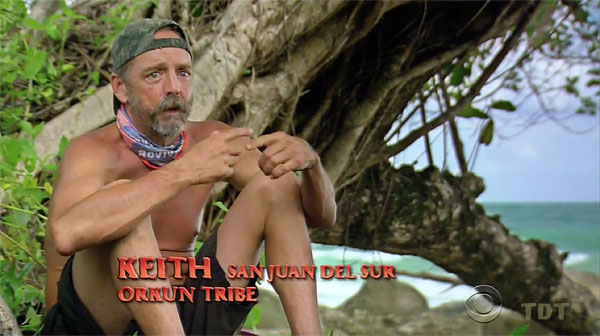 8. Keith — Holy poop! There was a moment this episode where I jumped off my couch and cheered. You know what happened? There was a quick shot of Keith spitting. Did you know that Keith loves to spit? He does. It’s fun for him. On a more ridiculous note, I was teaching a class last Tuesday and looked out into the audience and saw a student spitting into a cup. He was clearly dipping. So it’s time for a public-service announcement: Kiddies, don’t dip. It’s very bad for you. And it’s disgusting as anything. Just forget the dip and just spit for fun, like Keith. He’s a role model. He spits and plays Survivor twice.
8. Keith — Holy poop! There was a moment this episode where I jumped off my couch and cheered. You know what happened? There was a quick shot of Keith spitting. Did you know that Keith loves to spit? He does. It’s fun for him. On a more ridiculous note, I was teaching a class last Tuesday and looked out into the audience and saw a student spitting into a cup. He was clearly dipping. So it’s time for a public-service announcement: Kiddies, don’t dip. It’s very bad for you. And it’s disgusting as anything. Just forget the dip and just spit for fun, like Keith. He’s a role model. He spits and plays Survivor twice.- 9. Jeremy — Jeremy once again did the Hub proud this episode. He remains in a great spot and is looking good. However, I really do have a bad feeling Jeremy’s getting blindsided with his idol in his pocket. I sure hope I’m wrong, but if I’m not, I feel like it will be orchestrated by one of his “allies” named …
- 10. Stephen — Who knew Stephen was a poet? Did he know it? Oh, I rhyme because I love. I think Stephen’s going to be the one attempting to make a big move very quickly. I think he’s going to join with the non-alpha males to shake things up. And then he’ll read a poem or something. Or cry. Or talk about J.T.
- 11. Kimmi — I thought Kimmi might be one of the first folks gone this season, now I think she’s going pretty far. She’s currently set up well as an alliance member with a ton of big dudes and as a potential swing vote against the Meat Shields™. I’m not sure which way she’ll sway, and I’m pretty sure she won’t win the game, but, heck, after like 15 years, Kimmi Kappenberg, ladies and gentlemen. She’s a player.
- 12. Tasha — And, lastly, but certainly not leastly, we get to Tasha. I think this episode was, sadly, the beginning of the end for Tasha. She’s on the shortlist of players I’m rooting for, but while I think she won the battle this week, she might have lost the war. You see, she got Kass out, but she made herself a bigger target and really controlled this vote, I think. Bad idea. Everyone knows she’s smart and she’s definitely also good at challenges (no matter what dumb things Kass says), so she’s a clear threat, and you know what happens to threats most of the time.
OK, so let’s call it a day now. I’ll see you all next week, hopefully, And, hopefully, I won’t be sick. And, hopefully, we’ll be taking about another stellar episode, hopefully.
 Pat Ferrucci started watching Survivor when episode two of Borneo first aired. He’s seen every episode since. Besides recapping here, he’ll be live-tweeting this season from the Mountain Time Zone. Why? Because nobody cares about the Mountain Time Zone except when they want to ski. Follow him @patferrucci for Survivor stuff and tweets about anything and everything that enters his feeble mind.
Pat Ferrucci started watching Survivor when episode two of Borneo first aired. He’s seen every episode since. Besides recapping here, he’ll be live-tweeting this season from the Mountain Time Zone. Why? Because nobody cares about the Mountain Time Zone except when they want to ski. Follow him @patferrucci for Survivor stuff and tweets about anything and everything that enters his feeble mind.
- Index of articles
- Pre-season preview
- Ep.1: Vytas, SIT down
- Ep.2: Varner teaches the Old School
- Ep.3: Tasha sets the Tribal agenda
- Ep.4: Abi continues cultivating an irrational gameplan
- Ep.5: Let's get ethical
- Ep.6: Follow the leader... or not
- Ep.7: Framing how it all went down
- Ep.8: Second Chance primed for an incredible end game
- Ep.9: Did Stephen just open or close the gate to winning?
- Eps.10-11: Construction junction, how do you function?
- Ep.12: Spiraling toward what could be an amazing end
- Ep.13: Planning behavior before the finale
- Ep.14: Wrapping up a stellar season